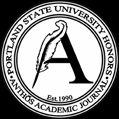How to Submit to Anthós
- Check that your article adheres to Anthós formatting requirements (full list here).
- 2000-3000 words
- Chicago-style citations (Notes-Bibliography style)
- Times New Roman, 12-point font, double-spaced
- 1-inch margins
- Manuscript saved as Word Document file (.doc or .docx)
- Go to “Submit Article” page. If you don’t have a PDXScholar profile (most common), create one using your pdx.edu email; login (not connected to ODIN accounts; will need new/different password). This email will receive subsequent Anthós emails.
- Read, accept Submission Agreement (see Submission Policies for more info).
- Enter your name (author name) and institutional affiliation (Portland State University).
- Optional: Add author(s) or co-author(s) if applicable (not common).
- Upload your manuscript.
- Enter your title. Make sure it matches the title in your document.
- Optional: Enter subjects (headings) under “keywords.” Refer to Subject Headings vs. Disciplines vs. Keywords section below for more information.
- Optional: Add (maximum) 250-word abstract. See abstract resources below.
- For “document type,” select “article.”
- Optional: Add information about the class for which you wrote the article. (e.g., “Written for HON 360 with Professor Summer.”)
- Upload your manuscript file as a Word document. (.doc or .docx)
- After reviewing your submission, hit “submit!”
- Accept (no revisions)
- Accept with minor revisions
- Accept with major revisions
- Reject
You will receive an automated email upon submission. The Anthós board will send a separate email confirming review of your submission beginning in Winter Quarter. Anthós editors will contact you within a month of the submission deadline to inform you if your article will be sent out for single-anonymized review (see more information here).
If selected for faculty review, expect a publication decision no earlier than a month (30 days) from your initial review notification. You can expect one of the following decisions:
You will receive your faculty reviewer’s author feedback, regardless of publication decision.
Authors whose articles have been accepted for publication will work with editors to revise papers based on reviewer feedback. Rejections happen for a myriad of reasons. We encourage Honors students to resubmit their revised papers for publication the following year.
Please reference the resources below while writing your paper or preparing for submission. Happy writing!
Author Resources
Preparing for Submission
- Honors Writing Center
- Work with a student writing tutor on your paper at any stage of writing.
- General Writing Resources Below are guides for writing academic papers, from brainstorming to proofreading.
Creating Citations
- Chicago Manual of Style
- Purdue OWL Chicago Style Guide
- Another helpful guide for creating Chicago citations (Notes-Bibliography).
- NB Sample Paper
- Notes and Bibliography: Sample Citations
- Examples of citations.
- MyBib
- Online resource for creating citations. Insert the cited works’ information to generate Chicago citations. Be sure to double-check all citations.
- Zotero
- Offline software for organizing research materials and creating citations. Add browser extension for streamlined research organization.
Writing an Abstract
- Anthós Abstract Guidelines
- Anthós’s official Abstract reference and style guide.
- Writing an Abstract Handout from UCLA
- Another guide to writing abstracts that may be useful to STEM majors.
Adding Subject headings
Subject Headings v Disciplines v. Keywords
Subject (heading)s are standardized terms used for indexing and cataloging academic work. When adding subjects, please reference the Library of Congress’s (LOC) subject headings lists. Subjects may overlap with disciplines but are typically more specific and represent an article’s subject matter. Disciplines refer to the academic community and audience the article belongs to.
If selected for publication, your editor will help you develop keywords for your article. Keywords are even more specific than subjects. Whereas subjects are more standardized LOC terms for categorizing an article, keywords are natural language words used within the article to boost readership. Keywords can refer to the topic, content, relevant scholars, or other significant persons, places, or things. Keywords may also refer to an event, such as the Civil War.
For questions or further submission assistance, please contact us at anths@pdx.edu.
